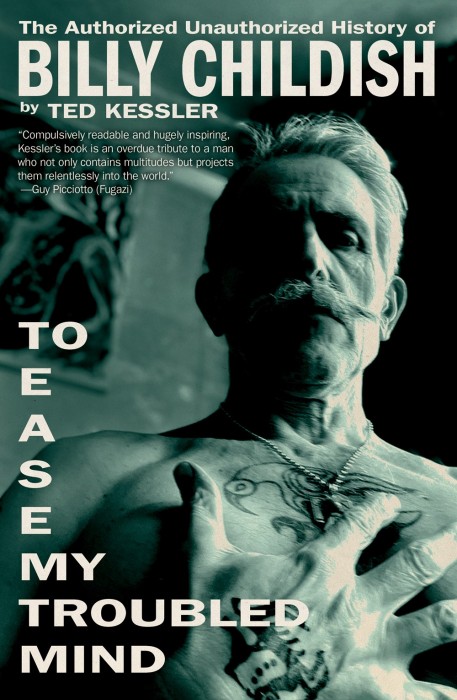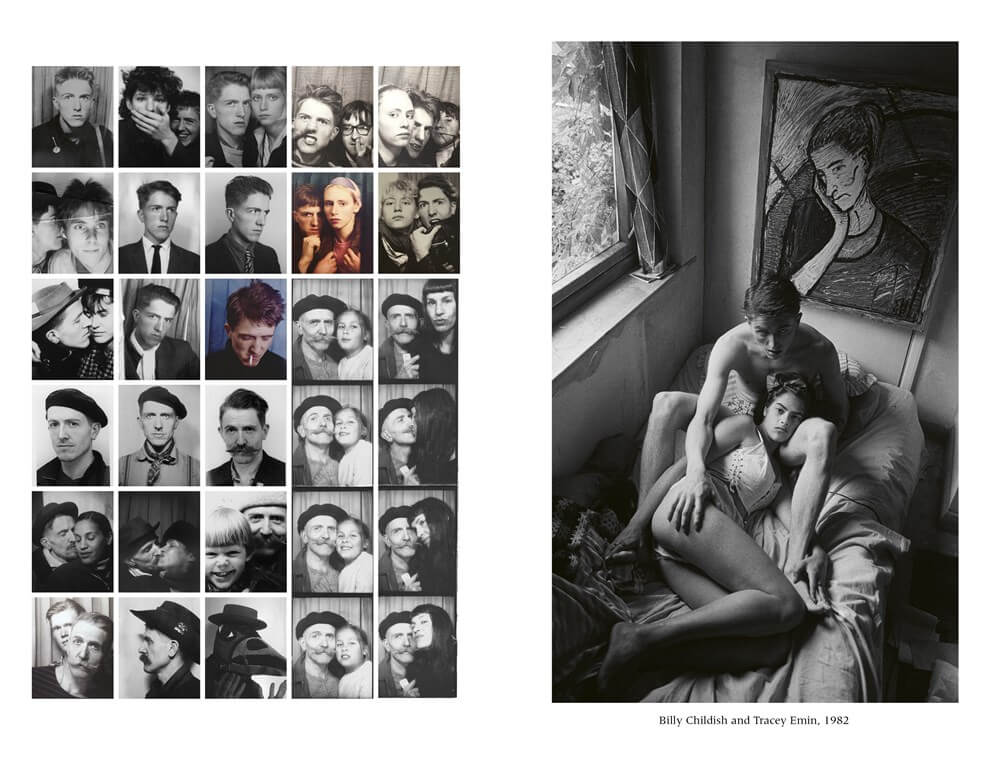Address change to reviews.pivic.com
This site is changing its address.

Billy Childish is, first and foremost, a human being. As such, as with all of us, there’s a mountain of different things that make a person who they are: their parents, passions, hates, loves, mind-expanding drugs (perhaps not for all of us), and disagreements, hopefully at least with ourselves.
This book is fragmented, but in an OK way. If you know Childish, you know he’s a very prolific person.
Billy Childish has released well over 150 albums with numerous different groups since his first with the Pop Rivets in 1979. He has published a dozen autobiographical novels and at least fifty collections of poetry, a couple of memoirs, along with several printed collections of his photography and art. He has produced thousands of paintings, and his work is exhibited around the world. And he’s not slowed down since crossing the border into his sixties in 2019. In 2022, he decided that he would attempt a musical “career in a year” and release an album a month with his William Loveday Intention. He nearly succeeded as well, defeated not by a lack of recordings but by the availability of vinyl.
From the very start, there’s what seems like honesty thrown into dialogue between the author and Childish:
How are you doing?
I’m okay. I’ve had better times. But I’m all right.
What’s the matter? Oh, I had a nervous breakdown about three years ago and I get real repercussions from it.
Ah, sorry to hear that. Are you on the road to recovery?
I’m sometimes all right, but I don’t take medication. I take natural stuff. Sometimes it feels .. . a bit excessive. It felt very difficult this morning in particular. I also have to have some tests for a pain in my side. But, you know, nothing is terribly wrong. Just your mind and body. Exactly. Just the bits holding me together. Nothing important.
And, of course, there’s humour.
To myself, Childish might grapple with his reputation. I’ve heard people mention he’s churlish, but as with anyone famous in some way, someone who’s gained success and punk-level success, there’s always going to be a lot of gripe and possibly envy thrown one’s way. The question is: how do you deal with it all? How do you deal with, at a very young age, joining the 1970s and 1980s punk music movement and stay mentally dapper throughout Thatcherite neoliberalist UK?
Are all your secrets in your work?
Most of me is available for inspection, yes. Often I don’t know what I’m going to say. I don’t feel overly identified with what I do once I’ve put it out there. I was saying to [my son] Huddie today about my painting, I bet people think I like what I do. It’s not necessarily the case. I do what I do. I don’t do what I want to do, I do what I do. Very rarely does something go the way I want it to, but I just follow it, obey it. It’s the same with the sound. It couldn’t sound more differently to how we imagine it. We just try to make it come across with energy and humanity, some semblance of meaning. The idea is to keep it sounding like a group in a nice old wooden studio with soft reverb and some genuine energy.
Childish is very much alive and was part of making this book. The author has, apart from constant contact with Childish, spoken with family members, lovers, collaborators, other artists, Stuckists,
One of the most interesting things about the book is how the author has captured Childish’s connections with lovers and collaborators. For example, there’s a simple paragraph about Childish and Tracy Emin, which says something.
On YouTube there’s footage of an event in London that Childish read at in May 1997, sitting alongside Tracey Emin, who swigs from a can of lager and listens with resignation to poems he’s written about her. During the event, Childish says (to the obvious pain of Emin): “Sanchia was the first love of my life, which I never quite recovered from. And probably the girlfriends that came after her were suffering from my anger. I was making them pay for her.” “Oh that’s a load of rubbish, probably,” says Sanchia Lewis today, batting away the thought, embarrassed. She is soft-spoken, self-effacing, and unwilling to accept responsibility for someone else’s behavior.

There’s a lot to be said about Emin and Childish, who, after their relationship ended, didn’t speak for a very long time.
I came back down to Margate. I don’t really know how I left Billy. I can’t remember it. I can’t believe I actually did it, because he had such a hold on people. You know, you’re madly in love, you’re nineteen, you think you’ve met the person you’re going to be with forever—and you read they got married. Then you realize they spent their wedding night with you. I mean, how did Billy keep it to himself?! Well, he didn’t keep it to himself because he wrote it in the fucking diary, and of course he wanted me to read it. He never had the guts to tell me. Billy would say, “But I’ve told you the truth.” He’d sleep with someone on tour. He’d come back, tell me, and go, “Well, I told you the truth.” Like the truth made up for what he did wrong. If Billy didn’t tell me something, then I didn’t think it happened.
Date: 2 July, 2023 Subject: billy hello ted i hope your well and show was okay i find those things weird i saw traci face to face 1st time in 5 years - she is pretty nuts she’s so off target - the meal after was bizarre over grown toddlers in suits and trainers eating big sweet afters like a child party I said to Julie - I’m so over what other people think is cool (never a paying member in the 1st place) X
It’s quite fun to hear Childish describe the Stuckists:
You were a founder of the Stuckists, which included Billy for a time. Tell me about that, please.
The Stuckist experiment was a worthy attempt to redress what we thought was a fault in modern art. We wanted to go back to the beginnings of modernism and try not to take the so-called ‘postmodernist’ route, which in my opinion is a cul-de-sac. Art literally painted itself into a corner, then forgot to paint. I mean, how can there be such a thing as postmodernism when modernism is still alive and kicking in so many new forms? We saw ourselves as ‘re-modernists.’ We thought that the Stuckists would be the vanguard of a re-modernist movement. What actually happened was a lot of groups formed around the world, calling themselves Stuckists, but there were some other re-modernists that emerged at the same time. Billy obviously thought it hadn’t achieved what it should have done, as he left after the first year. We did, however, accomplish some things, one of which is a return to figurative painting (which we were being told was dead) albeit in an imaginative form.
The book has a lot of interesting inflections and ideas on Childish’s art, and even of Childish’s ideas on what art actually is; as with most things in Childish’s life, it all comes across very segmented, cordoned-off, as though every part of Childish’s life is not mixed-up. I mean, it all really is, but it doesn’t seem that way from Childish’s way of speaking. His way of answering emails and writing poetry does give away a lot more, even though it’s nicely edited in a proto-childish (no pun intended) way.
The huge complex that is Childish’s father makes up for what I think is a very meaningful part of the book. Here are three paragraphs that describe this:
“My father is a complex, sociopathic narcissist,” says Childish today. “Not a bad guy, it’s just the way God made him.”
Billy Childish ran upstairs and told his father he could sleep in Nick’s room or on the sofa downstairs that night, but he had to leave June’s bedroom. John Hamper told him to go away and pulled the cover over his head, which Billy yanked from him. The disagreement continued to the landing. And that’s when Billy Childish punched his father down the stairs.
It would be another ten years before Childish spoke to his father again. Billy phoned him and John told his son that he’d had another child, Hugo, in the interim. John also came as close to an apology as he could muster, saying to him, “I’ve not been a very good father, but what can I do about it now? Nothing.” Self-reflection and empathy, says Billy, are beyond John.
Childish’s very matter-of-factly way of speaking and writing correspondence says a lot, but as I mentioned previously, his poetry and his writing make for a more complex picture of a person.
I adore how people speak about Childish. One apparent thing is that a lot of interviewees agree that Childish has had a profound impact on their lives, both in terms of supporting them wholeheartedly and also in just being a friend and/or lover. Now that Childish is older and getting more famous for his painting…there’s just no stopping him. He does what he does, to paraphrase himself. It’ll be interesting to see how his art, music, and life continues. It’ll be interesting to see if he chooses to write anything other than poetry in the future.
The only problem I have with the book is the repetition through the first half. There’s no need to mention facts over and over again, unless purpose comes with the repetition; there’s no need for repetition in this book, I think. It’s just lazy editing, and that pains the book. I think the book could have done with a deft editor’s touch to delete parts or at least tidy up segments, as with the recollections of Tracy Emin, that were strewn across the entire book. I’m not saying the book should have been chronological and in-order; I frankly don’t think that Childish should ever be considered ‘in order’, but the book deserved a hard hand at times. Altogether, this book is a triumph. It’s hard to not see that Childish both has deeply affected the contents and the making of the book.
At the end of this book, I was left with the feeling of having glimpsed a highly perceptive artist, one who tries to live his life remarkably honestly without fear. It’s a highly inspirational text and, in spite of minor flaws, is a book whose author should be proud of themselves.
To Ease My Troubled Mind is published by Akashic Books on 2025-01-07.
